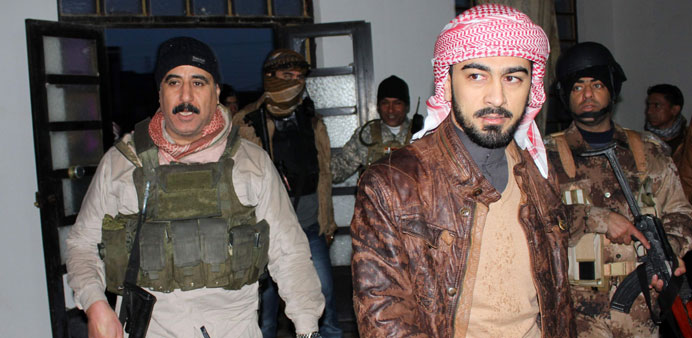Tribal militia commander Mohamed Khamis Abu Risha (centre) and tribesmen enter a building in the Malaab district of Ramadi yesterday.
Tribesmen and police retook two areas of Anbar provincial capital Ramadi from militants yesterday, but gunmen still held other parts of the city and controlled another one on Baghdad’s doorstep.
The United Nations and NGOs have said that civilians lack access to essential supplies such as food and fuel as a result of a government blockade, while Human Rights Watch has condemned rights abuses by all sides during the crisis.
Washington, meanwhile, has piled pressure on Baghdad to focus on political reconciliation, in addition to ongoing military operations, in a bid to resolve the standoff, which comes just months before general elections.
Gunmen seized all of Fallujah, just 60km from Baghdad, and parts of Anbar provincial capital Ramadi last week, the first time militants have exercised such open control in major cities since the insurgency that followed the 2003 US-led invasion.
Both cities are predominantly Sunni Arab and were former insurgent bastions in Anbar, which shares a border with Syria.
Yesterday, tribesmen and local police retook the Malaab and Fursan areas of Ramadi from Al Qaeda-linked militants, tribal military commander Mohamed Khamis Abu Risha said.
“We fought ISIL alongside our sons from the local police forces and returned them to their stations,” Abu Risha said, referring to the Al Qaeda-linked Islamic State of Iraq and the Levant group.
“They only control 10% of Ramadi territory,” he said of ISIL.
An AFP journalist in Ramadi also saw tribesmen and police apparently in control of the two areas.
Abu Risha, the nephew of a powerful tribal sheikh, has backed anti-government protesters and was implicated in the killing of five soldiers near Ramadi last year, but in ISIL shares a common enemy with the government in Baghdad.
Two civilians were killed and four others were wounded in violence in the city, according to a doctor, while eight militants also suffered injuries.
In Fallujah, meanwhile, a prayer leader called for provincial sheikhs to intervene to resolve the crisis in the city, but warned that the government “should not use the army for internal fighting in the cities”.
“Do not make Fallujah a place that attracts killing and blood,” Sheikh Abdulhamid Jadua said during Friday prayers.
Violence in predominantly Sunni Arab areas elsewhere in Iraq, meanwhile, left seven people dead, officials said.
A surge in nationwide violence to levels not seen since 2008 and the standoff over Ramadi and Fallujah are among the biggest threats to face Prime Minister Nuri al-Maliki during his eight years in office.
ISIL has been active in the Anbar fighting, but so have anti-government tribes.
At the same time, security forces have recruited their own tribal allies in the fighting that has raged in Anbar for more than 10 days.
Last Friday, hundreds of gunmen, some bearing black flags often flown by jihadists, gathered at outdoor weekly prayers in central Fallujah, where one militant announced that “Fallujah is an Islamic state”.
The Iraqi Red Crescent said it had provided humanitarian assistance to more than 8,000 families across Anbar but that upwards of 13,000 had fled.
A senior US official has warned the crisis could take weeks to resolve.
“We’re encouraging a patient and deliberate approach,” the official said, speaking on condition of anonymity. “I think weeks would be prudent.”

